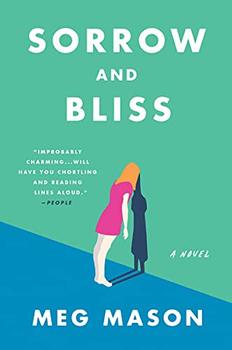Summary | Excerpt | Reviews | Beyond the Book | Readalikes | Genres & Themes | Author Bio

On the day we moved in, Winsome came over to help clean the kitchen. I went in to get something and saw my mother sitting at the table drinking a glass of wine and my aunt, in a tabard and rubber gloves, standing on the top rung of a stepladder wiping out the cupboards.
They stopped talking, then started again when I left the room. I stood outside the door and heard Winsome telling my mother that perhaps she ought to try and muster up a suggestion of gratitude since home ownership was generally beyond the reach of a sculptor and a poet who doesn't produce any poetry. My mother did not speak to her for eight months.
Then, and now, she hates the house because it is narrow and dark; because the only bathroom opens off the kitchen via a slatted door, which requires Radio Four to be on at high volume whenever anyone is in there. She hates it because there is only one room on each floor and the staircase is very steep. She says she spends her life on those stairs and that one day she'll die on them.
She hates it because Winsome lives in a townhouse in Belgravia. Enormous, on a Georgian square and, my aunt tells people, the better side of it because it keeps the light into the afternoon and has a nicer aspect onto the private garden. The house was a wedding present from my uncle Rowland's parents, renovated for a year prior to their moving in and regularly ever since, at a cost my mother claims to find immoral.
Although Rowland is intensely frugal, it is only as a hobbyist—he has never needed to work—and only in the minutiae. He bonds the remaining sliver of soap to the new bar but Winsome is allowed to spend a quarter of a million pounds on Carrara marble in a single renovation and buy pieces of furniture that are described, in auction catalogues, as "significant."
* * *
In choosing a house for us solely on the basis of its bones—my mother said, not the ones we were guaranteed to find if we lifted the carpet—Winsome's expectation was that we would improve it over time. But my mother's interest in interiors never extended beyond complaining about them as they were. We had come from a rented flat in a suburb much farther out and did not have enough furniture for rooms above the first floor. She made no effort to acquire any and they remained empty for a long time until my father borrowed a van and returned with flat-pack bookshelves, a small sofa with brown corduroy covers, and a birch table that he knew my mother would not like but, he said, they were only a stopgap until he got the anthology out and the royalties started crashing in. Most of it is still in the house, including the table, which she calls our only genuine antique. It has been moved from room to room, serving various functions, and is presently my father's desk. "But no doubt," my mother says, "when I'm on my deathbed, I'll open my eyes for the last time and realize it is my deathbed."
Afterwards my father set out to paint the downstairs, at Winsome's encouragement, in a shade of terra-cotta called Umbrian Sunrise. Because he did not discriminate with his brush between wall, skirting board, window frame, light switch, power outlet, door, hinge, or handle, progress was initially swift. But my mother was beginning to describe herself as a conscientious objector where domestic matters were concerned. Eventually the work of cleaning and cooking and washing became solely his and he never finished. Even now, the hallway at Goldhawk Road is a tunnel of terra-cotta to midway. The kitchen is terra-cotta on three sides. Parts of the living room are terra-cotta to waist height.
Ingrid cared about the state of things more than I did when we were young. But neither of us cared much that things that broke were never repaired, that the towels were always damp and rarely changed, that every night my father cooked chops on a sheet of tin foil laid over the piece from the night before, so that the bottom of the oven gradually became a mille-feuille of fat and foil. If she ever cooked, my mother made exotic things without recipes, tagines and ratatouilles distinguishable from each other only by the shape of the pepper pieces, which floated in liquid tasting so bitterly of tomato that in order to swallow a mouthful I had to close my eyes and rub my feet together under the table.
* * *
Patrick and I were a part of each other's childhoods; there was no need for us, newly coupled, to share the particulars of our early lives. It became an ongoing competition instead. Whose was worse?
Excerpted from Sorrow and Bliss by Meg Mason. Copyright © 2021 by Meg Mason. Excerpted by permission of Harper. All rights reserved. No part of this excerpt may be reproduced or reprinted without permission in writing from the publisher.
Your guide toexceptional books
BookBrowse seeks out and recommends the best in contemporary fiction and nonfiction—books that not only engage and entertain but also deepen our understanding of ourselves and the world around us.